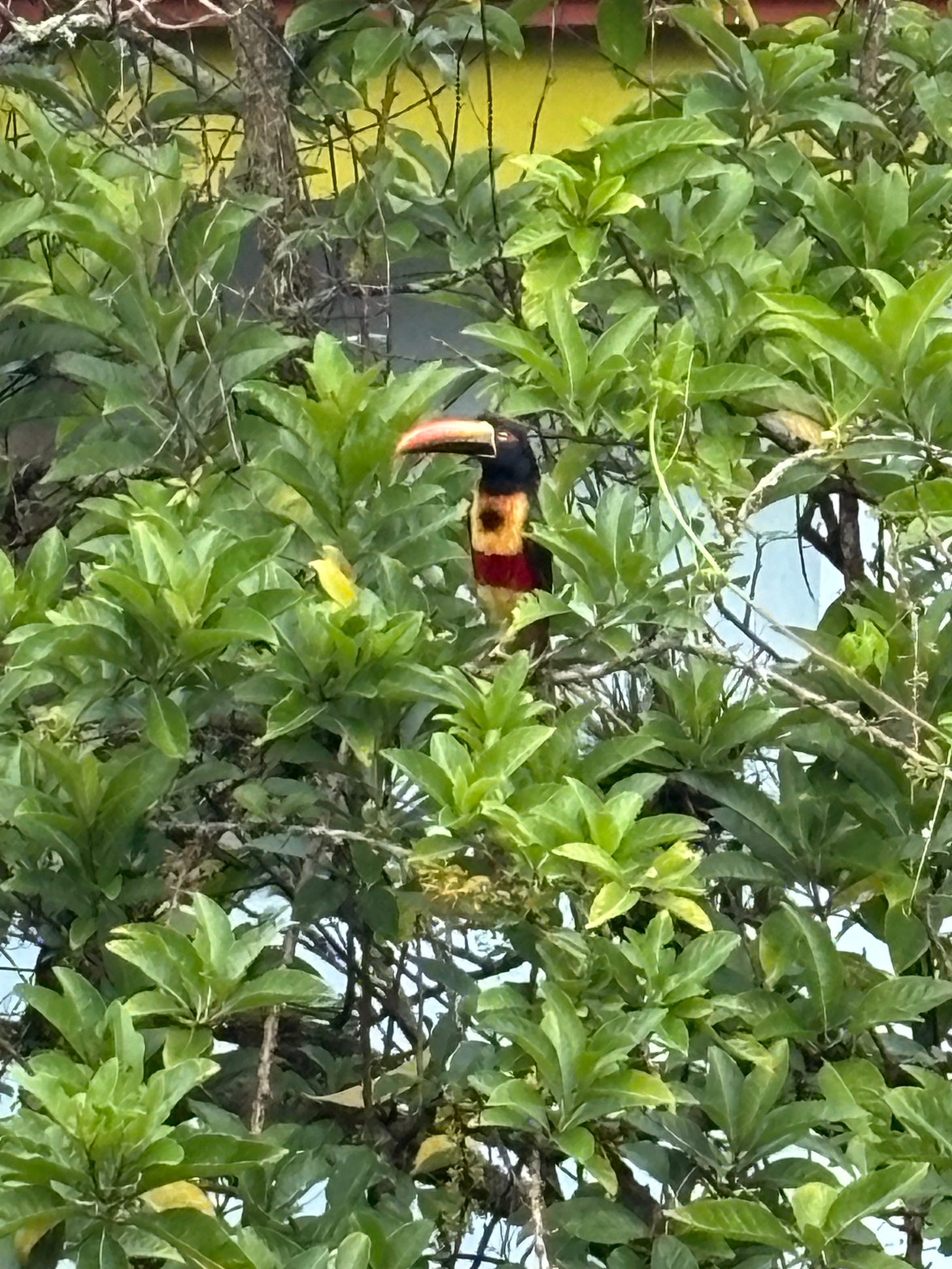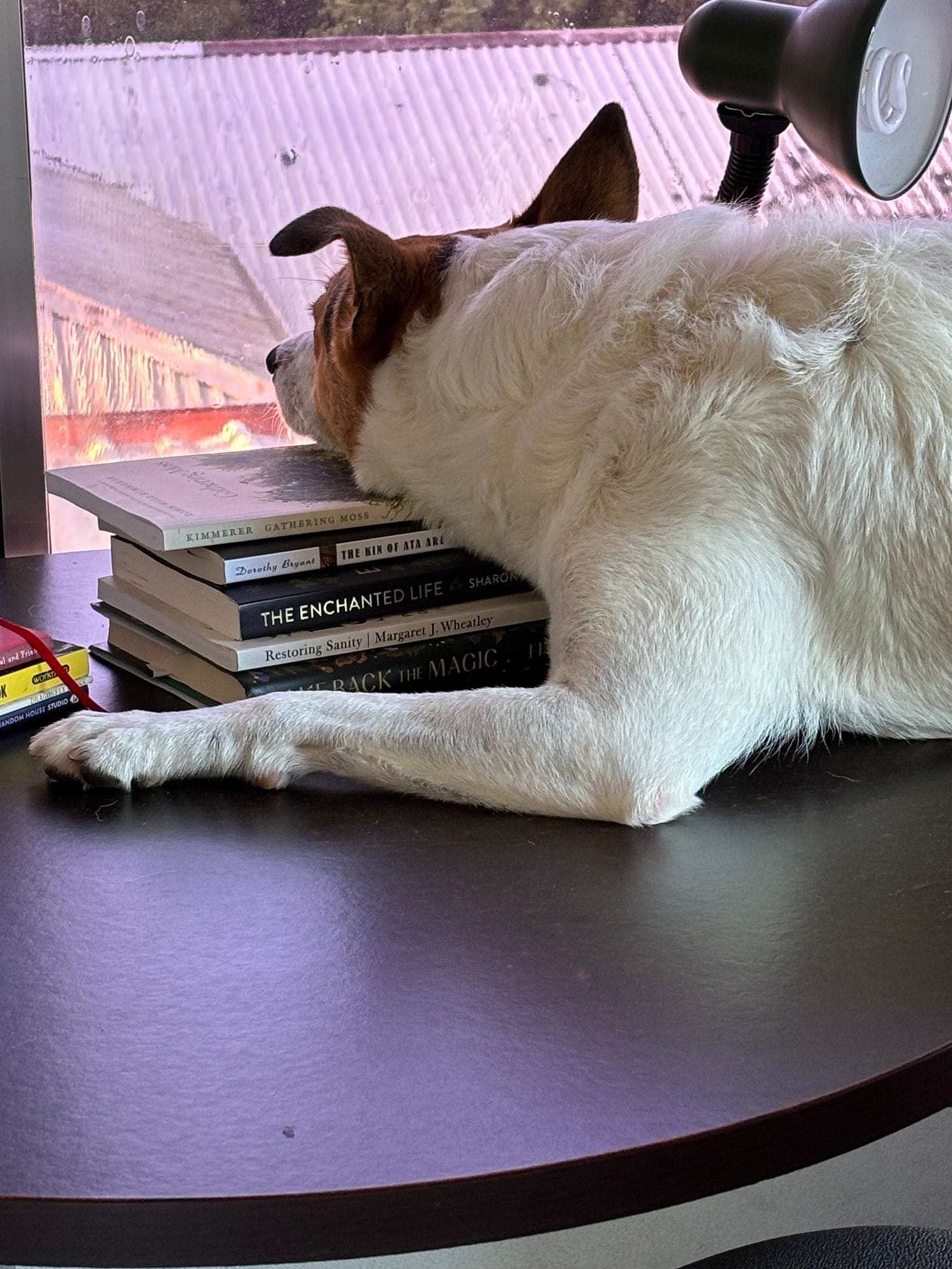Dear enchantable ones,
It’s the first week past grading, the first week with a little space from the demands of the academic year. I am in the early stages of regenerating myself, the early stages of dwelling.

People always ask if I am “off” now, and I don’t know how to answer that question. Not really. We’re sort of off, sort of on, like the way a light on the stove lets you know that the burner is still hot. There are still accreditation surveys to edit and send out, meetings to have, emails to send, preparations to make. But there is more space and more time and more choice in how to use it.
There is time for taking lines of flight.
Lines of flight are a concept developed by the French philosophers Gilles Deleuze and Felix Guattari. Lines of flight are destabilizing - “deterritorializing,” in their words - and open up new possibilities through new points of connection. Their concept is more complex than I am going to get into here, but I love the idea as a way of describing the possibilities that can emerge when we can follow our fancy, our enchantment, our disturbance, our curiosities toward the unknown. Rabbit holes of study, research, thought, and being that might take us somewhere we can’t go in tinier pockets of time and space, or when we are fixed in where we think we are going. Lines of flight demand meandering. Lines of flight necessitate not knowing.
During the academic year, during intensive teaching, there isn’t much time to follow lines of flight. Time moves too fast and there isn’t enough of it, not enough space, and often there is a semi-predetermined destination. But in the summer, if I am mindful of my time and not overscheduling and allowing for spaciousness, there is time to follow questions and thoughts and ideas and let one article lead to the next and on and on until you are on a completely different plane of thought and delightfully so. There is time and space to follow lines of flight. For me, this process of getting to choose what I read and write and think about is delightfully healing, a form of self-regeneration.
In the spirit of sharing a peek into my process1, here are some lines of flight I have been traveling on the past week. Maybe some of them will lead you on your own :)
My travel companions - my book stack
I am traveling with the books that have been sitting on my shelf, carefully collected on trips back to the US over the past year, but without enough time to read them while teaching. These books sit longingly in various stacks around my house (don’t let this )stack fool you- it is curated for this photo and there are others, yearning for me to read them. Finally, there is time and space, and significant delight in getting to sit with them. Some in this stack I have just finished (you can tell which ones by who I have referenced in my past few posts). These are some of the folks I am thinking with right now, who are traveling with me and taking me on lines of flight.

Regenerative peace pedagogies
I started the week by starting the draft of a chapter for an Earth Charter publication coming out of the re-imagining education conference in April. The chapter is an elaboration of my presentation, which was about pedagogies of interbeing for a regenerative peace education. This is also the theme I will be creating a ritual-workshop for the International Institute on Peace Education in Nepal coming up in three weeks. So this is a big theme of the summer, a line of flight I will be traveling down often.
As I started drafting the chapter this week, I got stuck on a thought that took me two days to pursue. I knew, in a book I love called Subversive Spiritualities by Frederique Apffel-Marglin, there was a quote I loved about regeneration. I felt like I could imagine where the quote was in the book - but the book had not made the selection that made the trek in suitcases from the US to Costa Rica. My copy is sadly now in storage. I searched for the quote online, but to no avail.
Finally, I found a PDF of the book, and while I couldn’t search for the word, I thought I remembered what chapter it was in. I skimmed but couldn’t find it, so I read the whole chapter. At long last, I found the quote:
The liveable world must be constantly rewoven for its fabric gets frayed or even unraveled in the very process of the rhythmic actions of the collectivities; because of this, rituals must be constantly reiterated. It is attending to this fraying, this unraveling, that I name regeneration. The world is enacted, the world is performed, the world is made through intra-actions (Apffel-Marglin, 2012, p. 163).
Finding the quote was like winning a scavenger hunt. This book was among the first assigned readings in my doctoral program, and made me feel like I had chosen well, like I was in the right place. The quote gives you a sense of that line of flight about regenerative pedagogies and ritual that I am traveling down.
I am returning to some old favorite readings.
Another reading I rediscovered this week is The Pluriversity for Stuck Humxns: A Queer EcoPedagogy & Decolonial School (McGarry et. al., 2021)2. I intitially read it when it first came out, but have found renewed inspiration around it that relates to my recent post about the Ritual Department. So I am delighted to be thinking with this article again, coming back around to it, and being re-inspired by it from my position now (which is different from when I first read it).
I am thinking about the question “What is research?”
I started thinking about this question recently when I was asked about my own research and later I was dissatisfied with the way I answered the question. I answered in a way that was limited by the idea of what research is, by what I actually do, and what I am supported in. I had answered in a way that restricted research to the formal, to the funded, while neglecting the research, writing, and scholarship I am doing on a daily, momentary basis. So I am thinking about this question and how I can better articulate my own process around it, perhaps something I will write about more later (and which this post, hopefully clearly, is in part about).
Somewhat synchronystically, I have gotten to have a lot of conversations with students about research this week, some of whom are working on master’s theses and some doctoral dissertations. I love nerding out about the research process, and I think this is where I can provide the greatest support and guidance: how to choose an idea (or let an idea choose you), how to navigate the tensions of trying to write a dissertation using liberatory and decolonial frameworks (and not just using them, engaging in them relationally throughout the process - I wrote about this extensively in my 2022 piece for Ecoversities), how to engage in reciprocity in research. This question and these conversations have me adding another old favorite article, Bayo Akomolafe’s The Myth of the Gilded Researcher, to my reading pile.

I’m thinking about community.
My friend Carlotta sent me a beautiful resource on weaving healthy communities that I have been nerding out about this week (thank you, Carlotta!). It was affirming in that it provides a framework for so much of the work I already do, in the classroom and beyond. It will definitely feed into the new course I will be planning for our department on Identity, Community, and Peacebuilding. This got me excited about the planning! Check it out.
As you can see, there is a lot of nerding out taking place this week, to my great delight. I am a proud self-proclaimed nerd. A friend once said to me “I think word is actually scholar,” and I think she is right, and I think both are true. Adding both to my bio :)
Those are some lines of flight I have been traveling this week, the rhizomatic fragments of reading and thinking and writing making up my summer study, taking me in directions still unknown.
Here’s to following lines of flight.
Here’s to allowing ourselves to be destabilized.
Here’s to the generativity of having time and space to meander.
Here’s to the unknown of who we might become when we give ourselves space to follow these lines.
What lines of flight are you currently taking? I would love to hear about them!
With love and care,
Stephanie
References:
Apffel-Marglin, F. (2012). Subversive spirtualities: How rituals enact the world. Oxford University Press.
Deleuze, G., & Guattari, F. (2013). A Thousand Plateaus. Bloomsbury Academic.
McGarry, D., et. al. (2021). The Pluriversity for Stuck Humxns : A Queer EcoPedagogy & Decolonial School. In Queer Ecopedagogies : Explorations in Nature, Sexuality, and Education (pp. 183–218). https://doi.org/10.1007/978-3-030-65368-2_10
I have written several pieces that are peeks into my process and will compile these into one place sometime soon!
There is not a copy available online to link, but I have a copy that the authors shared freely with a listserve I am on, so if you want to read it, send me a message :)



